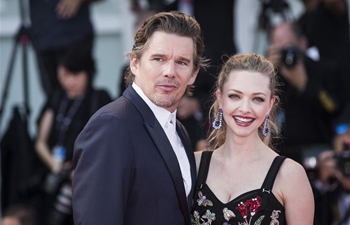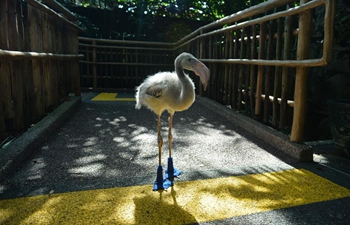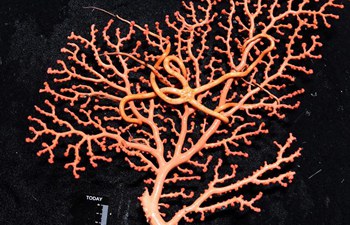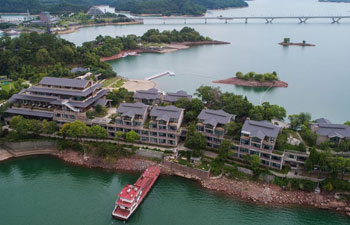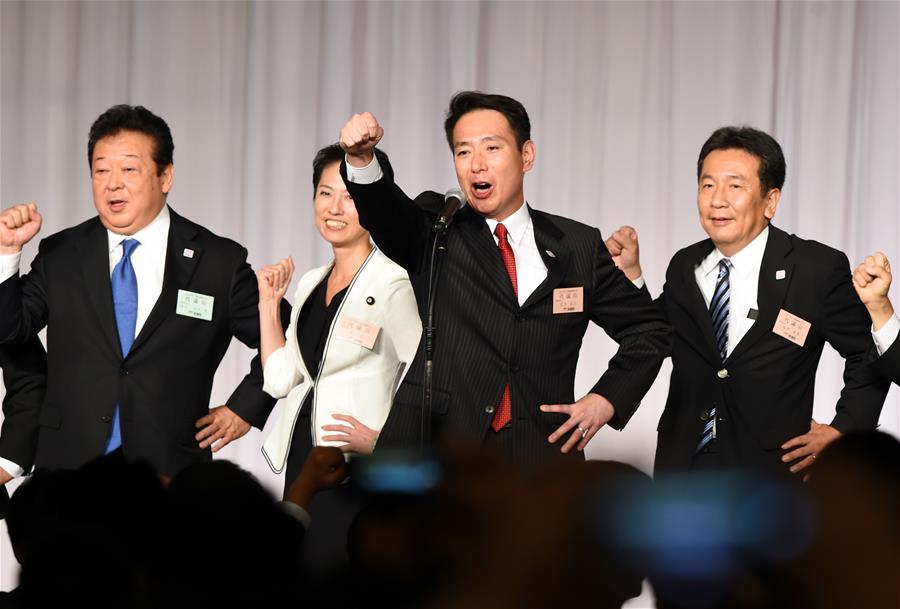
Seiji Maehara (2nd R) shouts slogans after being selected as the new leader of the main opposition Democratic Party of Japan (DPJ) in Tokyo, Japan, on Sept. 1, 2017. Japan's former Foreign Minister Seiji Maehara was selected by the main opposition DPJ on Friday as its new leader, seeing off his rival Yukio Edano, a political heavyweight who previously served as chief cabinet secretary when the party was in power. (Xinhua/Ma Ping)
TOKYO, Sept. 1 (Xinhua) -- Former Foreign Minister Seiji Maehara was selected by the main opposition Democratic Party on Friday as its new leader, seeing off his rival Yukio Edano, a political heavyweight who previously served as chief cabinet secretary when the party was in power.
On winning the top party's post, Maehara said in his acceptance speech that it was paramount for the Democratic Party to mount a serious challenge to the ruling Liberal Democratic Party (LDP), as the public, as things stand, see no other viable party.
"We must change this dangerous current political situation, in which the public can only choose the LDP, or pin their hopes on something whose form is still unknown," Maehara said.
"I vow together with you all to break out from this difficult situation, not for our own sake but for the public's sake," Maehara said at a party convention held in Tokyo for his fellow lawmakers.
Maehara won a majority 502 points, that comprised votes from the party's supporters, local and national lawmakers, as well as candidates likely to run in the next general election.
Edano, for his part, a prominent figure for the public during the March 2011 earthquake and tsunami disasters, won 332 points in the leadership contest.
During the leadership race, Maehara successfully garnered the support of conservative factions within the party, while Edano secured the support of more liberal members.
Maehara, 55, previously led the main opposition party when it was known as the Democratic Party of Japan (DPJ). The party was in power between 2009 and 2012.
The Democratic Party's presidential election was brought about after former leader Renho announced her resignation from the top post following a dismal performance by the party in the Tokyo metropolitan assembly election in July.
Tokyo Gov. Yuriko Koike's newly-launched Tomin First no Kai (Tokyoites First party) emerged a solid winner in the metropolitan assembly, which is known to be a barometer of the future direction of national politics.
At the time of the metropolitan assembly, Renho and the Democratic Party failed to capitalize on a series of scandals plaguing the LDP at the time, including an influence-peddling scandal which implicated Prime Minister Shinzo Abe, who also leads the LDP.
The Democratic Party itself has been hit by a number of its members jumping ship due to their dissatisfaction with the party's lack of clout in parliament and overall tenuous leadership.
The party leadership election comes at a time when the opposition camp is realigning itself to better tackle the LDP in the next lower house election, with Maehara stating that unity would be key to the party's and the opposition camp's future success.
Differences in opinion with Edano over jointly backing candidates with the Japan Communist Party (JCP) during the leadership race will have to be clarified by Maehara, who said at the time he planned to review the party's current stance, analysts close to the matter said Friday.
Issues of consumption tax, nuclear policy and constitutional amendment will also have to be clarified by Maehara going forward, they added.
In terms of economic policies, he had in the run up to the leadership race, previously suggested a moderate level of social welfare (increase) and a moderate degree of (state) burden, as well as supporting the view about raising the consumption tax rate to 10 percent.
While Maehara has hinted that he will join talks regarding constitutional amendment, previously stating that, "If we oppose the revision under the Abe administration, we won't be able to gain the understanding of the public," he has also been critical of Japan's security-related laws, describing them as unconstitutional.
Above all, in the short-to-mid-term, Maehara will be charged with boosting unity within the party ahead of the next lower house election that must be held by the end of next year.
He will need to repair the damage caused to the Democratic Party by an exodus of members and the sudden resignation of Renho.
Party insiders have said that it will be essential for Maehara to be an honest, pragmatic face of the party in order to convince the public there is a viable alternative to Abe's drive for something akin to single party politics.
They have also said this will need to be backed up by publicly supported policies.
Maehara comes from a constituency in Kyoto, western Japan and has been elected to the lower house eight times.
The new president's tenure will run through September 2019.






